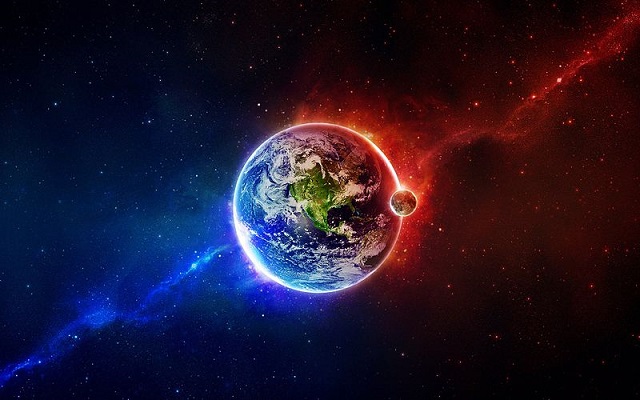Edward Gibbon’s Decline and Fall of the Roman Empire opens with a panoramic view of the Empire at its height.
As we stand in the beginning of 2016, it’s easy to look at global society and feel, as one might be reading Gibbon’s description of Imperial Rome, that we are not teetering on the precipice of calamity.
Those of us in the so-called developed world, and elites elsewhere, are in the throes of a decadence every bit worthy of the Romans. The top 1% owns half the world’s wealth while the bottom billion lacks even the most basic access to adequate food, clean water and safe shelter. Panem et circenses are alive and well, with no need to throw people to the lions, as the most horrific violence can be created digitally and accessed at a few keystrokes, and real violence is easily viewed under the guise of news.
This decadence and profoundly inequality has the generation in a position of both financial and political instability—and, thus, the seeds of its own demise are built into it.
A tiny elite enriches itself off of wars financed by the working masses that destroy the lives of millions and generate instability, in turn making necessary yet more defense spending and more instability. The crimes of the global corporations, from LIBOR fixing to money laundering for Mexican drug cartels to environmental catastrophes attributable to negligence, go unpunished except by the most cynical levies on their profits, encouraging a culture of corruption, lawlessness and looting of the declining middle class. So-called leaders are but administrators for a tiny and fantastically wealthy global elite, which they typically join (if they do not already belong to it) upon leaving office. The sham of free elections pits one corporate shill against one another, keeping the public focused on chosen personalities as the system slinks ever toward naked totalitarianism.
But this is not just the collapse of any empire—it is the collapse of an empire that fetishizes limitlessness.
The Romans had a natural sense of bounding. Trajan’s conquest of Dacia was considered a step beyond the natural limits of the Empire and a limit of one thousand years (which turned out to be pretty accurate) was mythically set on the Empire as a whole.
We, on the other hand, have made a cult of the infinite. The global economy is a Ponzi scheme, built on the logical fallacy of exponential growth—which, while necessary to keep an economy based on ever-spiraling debt creation alive, is doomed to collapse by definition. Financialization has made the parasitic money games of the casino economy the most highly rewarded pursuit on the planet, and bubbles and busts money-making opportunities—a game that will almost certainly end in economic collapse.
The unparalleled rapaciousness and exponential growth of our civilization, which is now in the process of consolidating the first truly global conquest in human history, has brought about a collapse of an unprecedented dimension. While past civilizations have exhausted their resource bases, overtaxed or oppressed their populations, or created top-heavy and unsustainable autocracies, this empire is bringing down the very biosphere before our eyes.
Exponential growth also means exponential production of waste, as our oceans fill with garbage patches and dead zones, our landscapes with filled landfills, and our air with the toxic byproducts of incineration—not to mention even more noxious forms of waste such as industrial chemicals or nuclear.
Exponential growth means the relentless exhaustion of the most basic resources of life—such as drinkable water, arable soil, even breathable air—as the population continues both to grow and to expand its per capita resource use. Global fish stocks are plummeting, plankton dying, coral reefs bleaching, oceans acidifying, aquifers being depleted and poisoned, and forests being decimated by clear-cutting, fire and blight. Wildlife is losing the protection and security for its habitats and biodiversity falling as species extinction accelerates past the levels of the preceding great extinctions, in an event of a geological proportions. We are literally sawing off the limb on which we sit as we check our phones.
But nothing we are witnessing is more ominous than climate change. 2015 just beat out 2014 as the warmest year on record, and 2016 is expected to beat that. Extreme weather sweeps the globe, with storms, floods, droughts and wildfires on the rise. The global climate system has visibly altered in the space of just a few years, with the jet stream going wavy, the Arctic vortex jolted loose to roam free as far as the US South, a “Cool Blob” of Greenland meltwater forming in the North Atlantic, and the Gulf Stream measurably weakening, to name a just few examples. This is no longer about weather, but about the redrawing of air and water circulation patterns in the global climate system due to differentially rising temperatures—you know: climate change?
This very bad year for the Arctic ended with above-freezing temperatures and rain at the North Pole, where temperatures are rising several times above the global average, and the first blue ocean event (ice-free condition) will likely be seen by 2020 and even as early as this year. A total sea-ice melt would send global warming into overdrive (just as a pot of ice water on a stove quickly heats once the ice is gone), which in turn will further threaten the vast stores of frozen methane deposits locked in the tundra and under the Arctic seabed. Methane levels are already soaring, around two to three times their pre-industrial levels, with levels in the Arctic regularly spiking much higher. The scientists studying these frozen methane deposits predicted in 2012 a potential 50-gigaton methane “burst” could come at any time. In 2014, the first giant craters (pingos) were found in Siberia and identified as methane blow holes. In recent weeks, similar blow holes were identified on the Arctic seabed. Scientists now identify precisely these types of eruptions as the key cause of the Permian Extinction, which killed more than 95% of all life on earth.
The cult of the infinite, epitomized by the psychotic fixation with GDP growth, is thus quite literally a death cult.
If any of the above is news to you, that’s probably because the corporations that control our economy and our political process also control our media. The first step toward facing our true situation is realizing that we cannot count on our institutions to inform us or to protect us. The oil companies knew about climate change nearly 40 years ago and have fueled denial campaigns ever since, and now are scrambling to drill in what will soon be an ice-free Arctic. The corporate cartels are in the process of cornering key resources, as water, arable land, timber, precious metals, etcetera are being scooped up by a handful of powerful actors. What this may mean in the event of a societal collapse, we can only speculate.
This society is structurally unable to face—let alone fix—the reality it has created. Its very logic is pushing it inexorably toward its own destruction. And for the first time in history, a societal collapse is also intertwined with the collapse of the living planet. We need to stop pretending that our society is healthy and start understanding the ways in which it is pathological, ecocidal and, ultimately, suicidal. We need to stop thinking in terms of electing the right candidate or striking the right climate deal, and start realizing the the only kind of change we can believe in at this point is the kind of change that can help us survive. Finally, we need to realize that our global society is also us; that we participate in it and that we have have the power to effect it. Our personal transformation is linked to the transformation of the world.
If this seems like a grim New Year’s message, it is because our only hope of identifying and facing the real issues is awareness. In 2016 may each and every one of us take this truth to heart and become a center of change for the world. Even as Western Civilization has broken out of the traditional boom-and-bust cycle of human civilizations, and led us to the brink of unparalleled planetary catastrophe, may we rise to the occasion by becoming an unprecedented force of good for all humans and all life.
Happy New Year.
~
Relephant:
How both Science & Religion can be Useful Tools or Counterproductive Dogmas.
~
Author: Peter Cohen
Editor: Caitlin Oriel
Image: Wikimedia Commons












Read 4 comments and reply